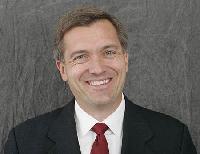Rocky's attack on Matheson: A conspiracy?
 Both deny mayor's sniping is part of a secret agreement to boost their careers
Both deny mayor's sniping is part of a secret agreement to boost their careers
By Rebecca Walsh The Salt Lake Tribune
Jim Matheson Attacked for being Bush-friendly
No one would expect Jim Matheson and Rocky Anderson to be buddies. Anderson is a royal blue Democrat; Matheson's political philosophy puts him closer to powder on the political color spectrum. Salt Lake City's mayor takes on the president. More often than not, the congressman votes with Bush on the big issues. Anderson has never been one to worry about political fallout from his liberal views. And Matheson is the ultimate political pragmatist, transforming himself in six years in office into what a reporter for The Nation called a "Bush Democrat." So it's no surprise that Anderson has started criticizing Matheson - on his radio show and in television and newspaper interviews. He's even suggesting Utahns should vote for Bob Brister, the Green Party's 2nd Congressional District candidate. "Just because somebody has a 'D' after their name doesn't make it so," said Anderson. "It doesn't seem like we have a real Democrat in this race." Anderson's shots at the congressman are unusual. It's considered bad form to take on another member of your own political party - particularly an incumbent in the middle of an election year. But the mayor is unapologetic and uncensored. He doesn't plan to stop. And Republicans are taking note. Some wish the mayor would just shut up, figuring his criticism can only help Matheson with conservative voters. But one Republican leader claims the spat between two of the state's top Democratic officeholders is a conspiracy, a secret deal between Matheson and Anderson to increase their own cachet with different constituencies. Salt Lake County Republican Party Chairman James Evans believes the mayor is "auditioning" for a job with a liberal think tank and the congressman is trying to lure more Republican voters into his camp. "I think it's coordinated with Matheson's campaign. He's helping Matheson win re-election," Evans told a University of Utah communications class this week. "It's another cynical ploy. It's vintage Rocky. He operates like [he's playing a game] in three-dimensional chess." Both Matheson and Anderson dispute the conspiracy theory. "That's crazy talk," Matheson said. And Anderson called Evans "paranoid and looney." But Evans' comments reveal the political implications of the spat. Conventional wisdom would say that anything the mayor does or says boomerangs outside of Salt Lake City. If he advises "Don't vote for Matheson," conservative Utah voters might give the congressman a second look. Rather than pushing voters toward Brister, Anderson's criticism of his fellow Democrat could pull voters away from Republican candidate LaVar Christensen and guarantee a Matheson win. Anderson knows that's a possibility. But he says he feels compelled to take on the congressman. And if liberal voters actually take his advice and jump from Matheson, leading to Christensen getting elected, so be it. There's little difference between the Democrat and Republican in this race anyway, he says. He notes that Matheson voted for the Bush tax cuts and war in Iraq, for a federal constitutional ban on same-sex marriage, to limit so-called partial birth abortion, for free trade with Central America and to keep Terri Schiavo on life support - all initiatives opposed by many Democrats. The mayor brushes off Democrats who complain he's setting up Brister to be a spoiler. He says the 2000 presidential election, when Green Party candidate Ralph Nader siphoned off some of Democrat Al Gore's voters, is not comparable. Anderson says he's angry at Nader for spoiling that race because there were significant differences between Gore and Bush. But with Matheson, "in terms of a voting record, it can't be worse [with Christensen]," said Anderson, who ran unsuccessfully for the congressional seat in 1996. Matheson has only confronted Anderson indirectly, having a staff member call after the mayor criticized the congressman at a Human Rights Campaign dinner at gay-rights leader Bruce Bastian's home earlier this summer. And Matheson spokeswoman Alyson Heyrend says the congressman is comfortable with his support among Democratic voters, which the campaign gauges at more than 90 percent. "People know Matheson. They know Matheson's approach. They know Matheson's philosophy. They judge Matheson on Matheson," she said. If an anti-Rocky backlash results, former Salt Lake City Mayor Ted Wilson says, it will be organic. The longtime Democrat and Anderson adviser says Republican conspiracy theories are "overreaching." He believes Anderson's comments are more about the mayor "feeling his oats" as he heads out of office. "It is almost more about Rocky than it is about Jim," Wilson said. "Rocky's deepest conviction is that we're all too timid in what we say. There's a tendency in Rocky to say whatever's in his mind. He's the most unfiltered political leader I've ever known." State Democratic Party Director Todd Taylor dismisses the back-and-forth as a media phenomenon. Still, party Chairman Wayne Holland called Anderson after the mayor suggested voting Green this year in a television interview on KSL. Taylor said Holland did not, and probably could not, ask Anderson to be quiet. "It's Rocky being Rocky. What's the point?" Taylor said. "We weren't happy when he endorsed [Republican] Mitt Romney for Massachusetts governor. We weren't happy when he endorsed [Republican] Keith Christensen for mayor. But he has a right to do what he wants to do." For his part, Brister will take all the help he can get. He says Matheson doesn't represent a big chunk of his constituency. He calls the congressman "anti-environment, anti-labor and anti-gay." "I'm not delusional. I don't expect to move to Washington D.C. in January," Brister said. "But people have a right to vote for people who represent them. I'm filling a vacuum on the left side of the political spectrum." walsh@sltrib.com





